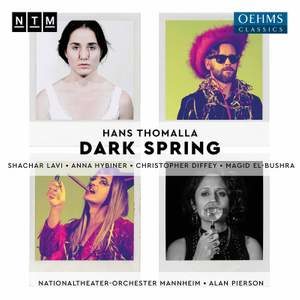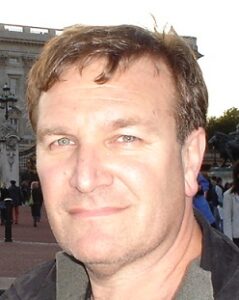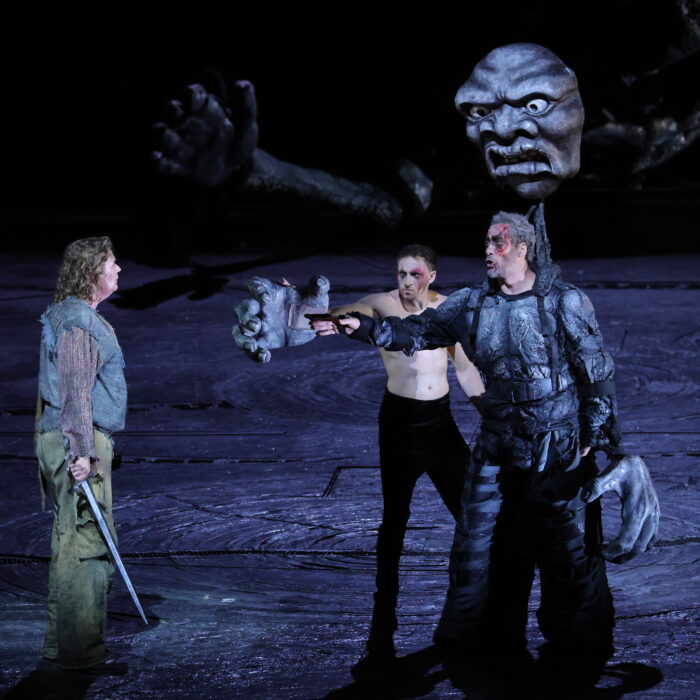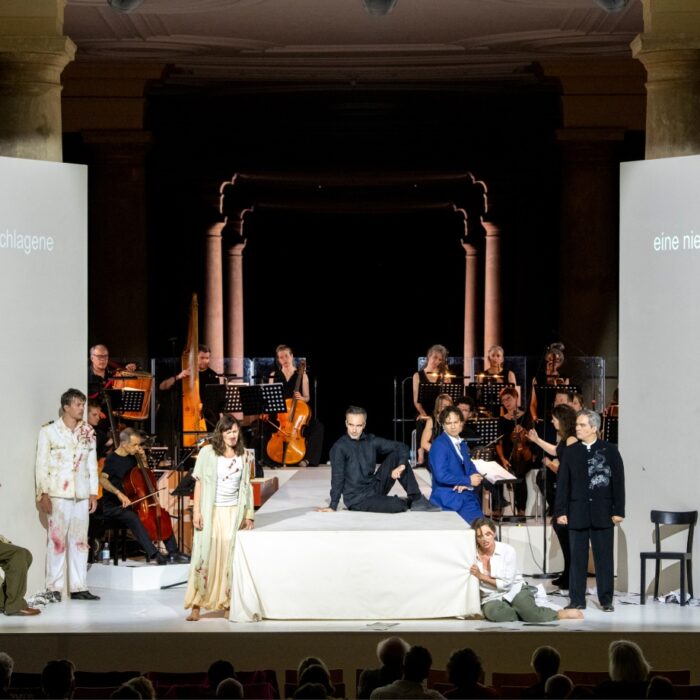
CD Review: Oehms Classics’ ‘Dark Spring’
By Gordon Williams(Photo credit: Hans Jörg Michel)
Hans Thomalla’s third opera “Dark Spring”—the others being “Fremd” and “Kaspar Hauser”—was premiered by Mannheim Opera in Fall 2020 and recorded by Oehms Classics over the course of its five performances. Since November a recording has been available both online and as a CD. It is this recording which is now being reviewed.
This work depicts four young people who have grown up under the pressures of modern life. Israeli mezzo-soprano Shachar Lavi sang the part of Wendla, Swedish mezzo-soprano Anna Hybiner appeared as Ilse, Australian tenor Christopher Diffey sang Melchior and the part of Moritz was played by Sudanese counter-tenor Magid El-Bushra. The Nationaltheater-Orchester Mannheim was conducted by Alan Pierson, while Barbora Horáková Joly served as the production’s director and Cordula Demattio oversaw the dramaturgy.
The opera is actually a dramatized song-cycle, a fresh example of the interesting modern musical hybrid known as a ‘song opera.’ In performance it runs continuously, but the various numbers function just as easily as stand-alone musical pieces that often hover above the incidents which one would assume inspire or reflect the words.
You probably need some degree of visual clarification, and there is video of the production on Vimeo. Here you can see how Horáková Joly’s direction, Annemarie Bulla’s design and Sergio Verde’s video, along with the cast and crew’s hand-held ‘footage,’ added not only extra dimensionality but a more concrete definition to this coming-of-age story. Production stills in the CD booklet also reflect the degree of theatricality involved.
Conductor Alan Pierson, a colleague of German-born composer Hans Thomalla at Illinois’s Bienen School of Music, talks appreciatively of Thomalla’s music in the insert booklet. “Song forms that recall American popular music…ostinatos that wouldn’t be out of place in the music of Reich or John Adams… extended instrumental techniques that reflect Hans’ love of sound-oriented European composers like Sciarrino and Lachenmann.” It is easy to see why Pierson would enthuse. The score is virtuosic, encompassing in a single work numerous recent forms ranging from challenging to catchy: “First it was GOAT’S milk, and/ then it was BEER.” Exceptionally detailed and multi-colored–at one moment there is a combination of solo cello, high bass, jazz brush on snare, and electronic sound (“Romantic Strings” which segues into “Vinyl Crackle”)–it is beautifully performed and recorded and deserves repeated listening. The score should not be challenging for those with conservative ears. Even semi-tonal clashes between singers and their accompaniments at key moments are enjoyable: ‘exquisite’ is a word that comes to mind.
The four cast-members are excellent. There is much color and character differentiation in their interpretations, particularly in the scenas performed by Wendla (Lavi) and Moritz (El-Bushra). “Melchior Gabor told me once he doesn’t believe in anything,” sings Wendla in a song–essentially an aria–that begins caressingly, enriches momentarily on the line “He told me he did not believe we should sing,” before flowing back to effective colorlessness on “even of sorrow.” A beautiful sense of disappointment is conveyed through her vocal coloring.
“Moritz decides to put an end to his life” writes dramaturg Demattio in her printed synopsis of Part Three, and El-Bushra’s declamation on a phrase like “There was nothing here that I could afford to hold against hope,” and of course his shrieking on the word ‘dark,’ expresses his fatal sense of alienation.
All four singers exhibit crisp, clear diction, which is fortunate when words are compressed, as with Melchior’s “There’s– nosuchthingas– love.” And the four singers’ ability to find expressive flexibility in a score which must be hard to pitch and time accurately is admirable. One thinks of the seamless exchange of thoughts between Ilse (Hybiner) and Wendla (Lavi) in “Melchior Gabor…”
Perhaps it is in the orchestration and ensemble work of the orchestra that the delight of the work can most be savored. One need only note the tricky metric shift just before “Do you remember…” Even something so simple as a quiet snare roll creates suspense under Moritz’s yearning “Give me your hand, Melchior,” a clue to his growing alienation.
The playing is terrific. Conductor Alan Pierson manages the score adroitly. But what about meaning?
Just listening to the score on a single hearing, it can be hard to work out what is going on: I listened a few times. “There’s a dryad in the tree” sings Melchior at one stage. It feels like an odd thing for a 21st century young person to say. On reflection, he seems to be referring to Wendla whom he can hold “in a name.” Moritz passes his exams, then he doesn’t. How does that come about? Wendla’s opening lines: “This dress is not too short. What do you want?” seem wide of the mark and not directed at anyone. It is almost as if there is someone else feeding the question.
And, in a sense, originally, there was.
“Dark Spring,” with a text prepared by Thomalla and elegant song lyrics by Joshua Clover, is based on Frank Wedekind’s 1891 play “Frühlings Erwachen” (Spring Awakening). The story is a tragic one: adolescents try to come to terms with sexual awakening in a repressed, Lutheran bourgeois society where the adults are hopeless at providing any guidance. In the play, the question “What do you want?” (“Was willst du den!”) was Frau Bergmann’s, expressing her frustration at not being able to keep up with her teenage daughter Wendla’s growth.
In Thomalla and Clover’s conception there are no adults: no head-in-the-sand parents, no oppressive clergy, no teachers expelling Melchior for preparing a sex manual for Moritz.
Fair enough, Thomalla’s adaptation is concerned with slightly older people who are facing modern-day issues – addiction, identity, “pressure to over-achieve academically, to attain popularity, and to ‘perform’ romantically or sexually” (Thomalla’s words) against more insidious influences than Wedekind portrayed.
But, now several steps removed from Wedekind’s specific incidents, it is as if nebulous forces propel the characters into that “extreme pressure to achieve” and other behaviors. The characters battle environment–Thomalla writes of “late capitalism’s demands of permanent self-optimization”–rather than people. Without the adults compelling responses, a lot of the young people’s reactions seem to be auto-alienation, a series of “own goals”.
And lines outside their original context and juxtaposed pointillistically in a new one can be puzzling; or, at least, they initially puzzled me. “Great – God – in heaven!” exclaims Wendla–it is spoken–after Ilse explains “One must love a man.” But what has led to the explosion? The line is Wedekind’s, but here there seem to be beats missing. She asked Melchior to beat her. Out of what cause?
Admittedly the text was sufficient to inspire good music from Thomalla, but is it possible that an audience simply listening in a single sitting and striving to focus and comprehend may not have time to savor the musical bloom that this edit of Wedekind’s text inspired? It all seems a far cry from the Verdian principle of putting the audience, as critic Matthew Gurewitsch once said, “squarely in the picture.” Cue the program booklet or the director, or at least the added definition of a production.
Admittedly, Wedekind’s play is allusive to begin with. Mother Schmidt, for example, is not even mentioned in Wedekind’s cast list yet the sound of her knock on the Bergmanns’ door is enough to tell us that she’s come to perform an abortion on Wendla, who will die from the botched operation.
Does the loss of this context matter? And how specific or concrete in meaning should an opera be? It is worth noting that the production itself put the adults back in–through documentary-style interviews with four ‘parents’–during the orchestral interludes.
But, after all, this is also a song cycle, and it is possible to think of the songs as poetic musings on the substratum of an updated plot for an audience already in the know, prepared to work a bit harder at deducing or that enjoy savoring the various potentials in meaning. Thomalla himself says, “Under the surface of the objectified schemata of song an almost raw and undomesticated sound-world simmers…that breaks through at crucial points of the plot–a sound-world of noise, screams, and silence.”
In terms of sound, Thomalla’s work has an attractive ending. But if it is happiness, it is ambivalent or resigned. “Be cheerful, Wendla, be cheerful.” But how can she be cheerful after all that has broken through and she is interrupted by Ilse and Melchior’s beautifully in-unison but cynical “What difference does it make?”
Yet it is still radiant. “I want to go over the meadows in the twilight…” sings Wendla (Lavi) in another of those moments where Thomalla allows a voice to shine, and to a melodic line whose beauty goes on after the closing bars.
There are other settings of Wedekind–Alban Berg’s “Lulu” and “Spring Awakening,” a Tony Award-winning rock musical from 2006–but maybe Thomalla’s “Dark Spring,” so musically satisfying, raises interesting considerations in the perennial debate over the relative importance of music and words, both poetic and dramatic.



